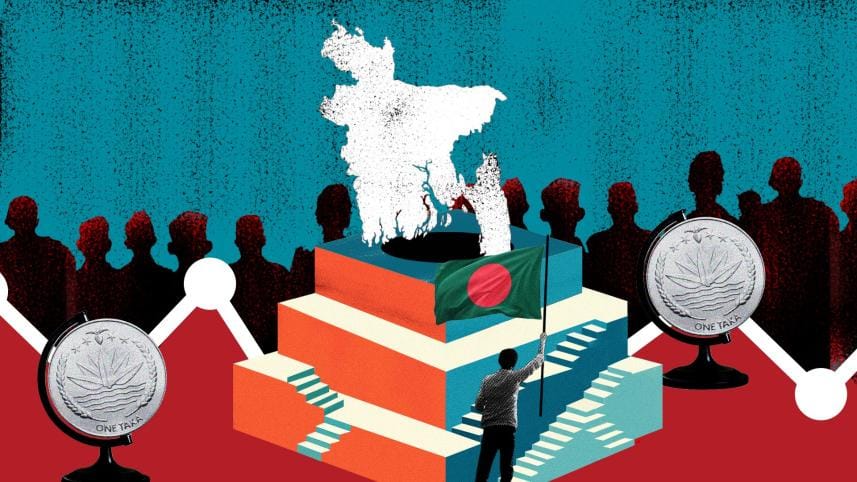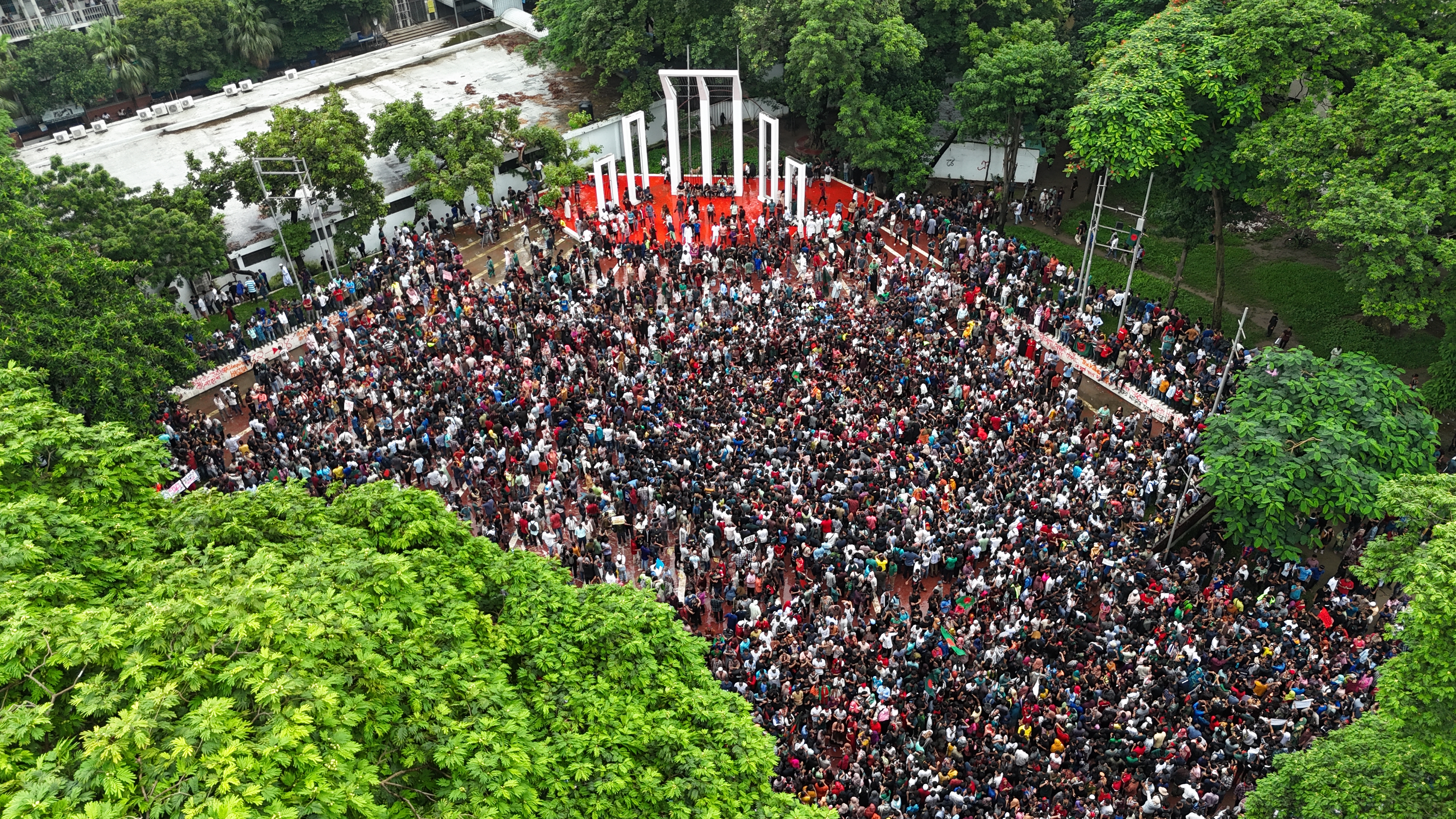Democratising the economy for all

The interim government inherited a broken economy from the toppled regime, which had collapsed due to people's wrath. Serving its oligarchic clientele, the deposed regime, severed from the people's hopes and desires, robbed the economy to the point of brink.
From this suffering, the people rose in defiance against fascism. Their resistance, forged in the fires of disappearances, killings, and state terror, finally erupted in the July uprising last year. The working class and students stained the streets with their own blood in the uprising, as they sought liberation from the unrelenting crisis. The regime's brutality left deep scars.
Since 2008, a cabal of politicians, bureaucrats and business people nurtured an economy of patronage, a system where the spoils flowed to the connected while the majority languished. Institutions were hollowed out, democratic rights suffocated, and accountability tossed aside like inconvenient truths. Through the concentration of power, an extractive economic order was imposed.
The current arrangement, born of that political order, structures the economy as a gated fortress, excluding the public from meaningful participation. As a result, unemployment continues to rise. Youth unemployment has reached intolerable levels while new waves of poverty crash upon households.
Investment is stagnant; without investment, there can be no jobs. Real wages are falling. People can barely cope as inflation erodes their earnings. Social cohesion is fraying. Workers' lives have hit rock bottom. These circumstances cause inequality to thrive. Bangladesh, full of potential, continues to stumble in its journey to become a democratic state for all.
Breakdown and repair
The interim government cannot be expected to fully restore the economy. Yet, it has taken steps. Inflation has slightly eased. Foreign exchange reserves have increased due to higher official remittance inflow, growth in exports, external loans, and lower imports. Reforms have begun in banking oversight and legal frameworks.
The outgoing regime's budget should have been revised immediately after the interim authority took charge. Given the absence of a parliament after the uprising, ordinances were issued under Article 93(3) of the constitution to pass the budget and related statutes. The government has held talks with political parties; it could have engaged with them on the budget. There remain deficits in the constitution concerning the people's sovereignty over public finance. A dialogue could have helped create the blueprint of a budget-related reform agenda.
The economy remains a ship adrift. According to preliminary estimates by the Bangladesh Bureau of Statistics, GDP growth in FY2024-25 stands at 3.97 percent, the lowest in two decades outside the Covid period. Tax collection is just 7.2 percent of GDP. The NBR tax-GDP ratio fell by 0.66 percentage points compared to last year. Debt servicing has climbed. The government repaid $4.09 billion in external loans, a 21 percent rise in just one year. By December 2024, non-performing loans had crossed Tk 3.45 trillion. Dependence on imported energy and a depreciating taka have also driven electricity costs up.
In this setting, marred by inflation, joblessness, income inequality and instability, the situation is visceral for the working class. The World Bank warns that poverty and inequality could worsen. By 2025, national poverty could reach 22.9 percent, with extreme poverty at 9.3 percent, resulting in three million new poor.
Labour demand has shrunk greatly, and private sector hiring has declined, while domestic investment remains frozen. Day labourers, farm workers, and transport workers are bleeding income. Women, especially in informal sectors, are the worst hit. According to the International Labour Organization (ILO), from 2013 to 2022, the working-age population grew by 1.5 percent annually, while employment growth was a mere 0.2 percent. Unemployment continues to rise at an alarming rate.
From crisis to transformation
The road ahead cannot be paved with band-aid solutions. Structural bottlenecks must be addressed at the root. Massive job creation is essential. Young people must be integrated into the labour force with fair wages. Otherwise, the demographic dividend will indefinitely remain out of reach.
New waves of investment and an industrial policy built on diversification, competitiveness and productivity, rather than cheap labour, can generate jobs. But transformation is not possible without a skill-based and future-ready education system. Education must prepare young people not just to survive, but to thrive.
Structural reforms demand a coherent medium and long-term strategy. But no long-term reform can be truly realised without political legitimacy.
What the economy needs more than emergency repair is democratisation. Democratising the economy is not the job of an interim caretaker. It must be carried out by a government elected by, and accountable to, the people. The longer this transition drags, the more fragile reforms become.
Investors do not gamble in twilight; they wait for sunrise. That is why the most urgent task is to return power to the people through free, fair, and inclusive elections. Only a legitimate government can inspire trust, ensure policy stability, and create the conditions for meaningful transformation.
The interim government's historic task will be complete only when it ensures a peaceful transfer of power. The election must not be treated as a procedural formality, but as a democratic necessity.
The economy is not just about interest rates or revenue targets. It is about people and their right to shape their future. Reclaiming that right is the most profound economic incentive and stimulus. It is time for the people to have their say, and for the journey of transformation to begin through democratic practice.
Dr Rashed Al Mahmud Titumir is professor at the Department of Development Studies in University of Dhaka.
Views expressed in this article are the author's own.
Follow The Daily Star Opinion on Facebook for the latest opinions, commentaries and analyses by experts and professionals. To contribute your article or letter to The Daily Star Opinion, see our guidelines for submission.




 For all latest news, follow The Daily Star's Google News channel.
For all latest news, follow The Daily Star's Google News channel. 

Comments